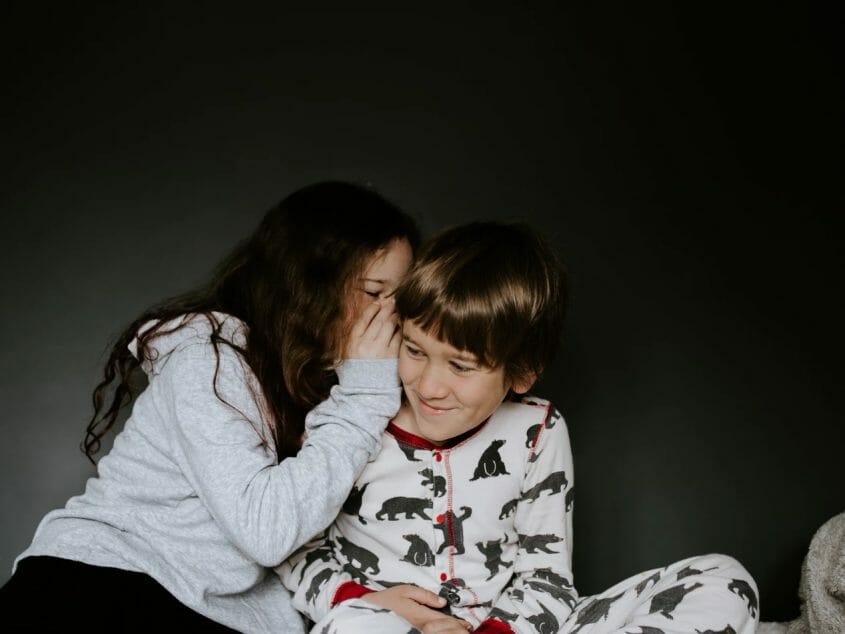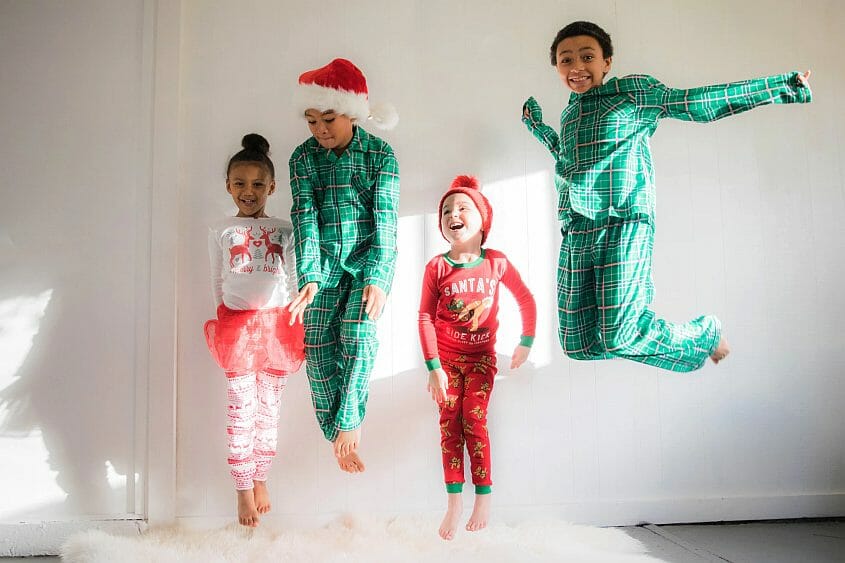
This month, my 7-year-old daughter invited her friend to sleep over. Her mom, who had told me before she did not allow sleepovers, explained that she did not think the kids were ready for a sleepover until the age of 10. I then started to wonder whether there actually was a “right” age for a sleepover.
Many kids spend nights away from mom and dad and stay with other family members, right? If they are lucky (my kids are not), they have Grandpa and Grandma around the corner to make the sleepover a very special outing. If they are even luckier, they have cousins of the same age to spend holidays and weekends with.
But if kids have none of these, they depend on their parents’ perception of the “right” age for them to be able to sleep away from home.
As a child, I fell into the second category. Grandpa and Grandma were not much of a thrill, but I was fortunate to have cousins with whom I had the most memorable sleepovers.
Do you remember when you were a kid having a sleepover how at night the adults would come in to shoosh you to sleep, which only made you laugh more for no good reason at all, just out of a silly desire to stay awake all night and giggle?

I remember the first real sleepover I ever had. It happened when I was about 13 and a friend of mine invited me to sleep at her house.
Luckily for me, her parents were not strangers (they had a funny relationship, because my dad had crashed into my friend’s dad’s motorcycle and broke his leg, but her dad was a police officer on duty and apparently the accident was his fault, and they became good friends after that. 11 years later, our dads were still friends when I asked to stay over at her place).
I think I cried for 2 months straight prior to being allowed my first sleepover, because my parents, despite all my begging, would not allow me to go. They were not completely heartless, though. I was actually sick at the time and had to take medication and they were very concerned about that, but I still did not like them saying “no”.
I remember my excitement the day before I finally got my sleepover. I could not sleep that night from the excitement. When I got there, my friend’s house looked so beautiful and her parents were so nice and welcoming.
Isn’t it funny that it was 30 years ago and I still remember every detail? I remember their house, I even remember that her mom exercised in front of us, wearing a transparent sleeping gown and I could see her red sexy underwear.
I remember being very surprised, because I could never imagine my mom walking around with a sleeping gown in front of anyone – not even in front of us – let alone a transparent one!

Unfortunately though, the number of sleepovers I had throughout my childhood can be counted on two hands. And after every one of them, I realized exactly how much I was missing. It was only as an adult, when I was studying education, that I actually learned about the importance of sleepovers in kids’ development (and their parents’ development too).
A sleepover is a good way to help kids progress to the next level of their emotional intelligence. They develop a skill that no money can buy and no teacher can teach. It is one of those things everyone needs to experience on their own.
Here are just some of the advantages of sleepovers:
- A sleepover requires flexibility. Kids are forced to leave their comfort zone and take themselves into new territory, into the unknown. With Mom and Dad knowing the host family, a sleepover can teach the kids that they can take that risk and survive it.
- A sleepover allows kids to examine the differences between their family and the host family. Yes, it includes the risk of them finding advantages in the host family and faults in their own family, but it is a great opportunity to show them different ways of living and to talk about the choices you have made as parents in running your family. Such talks will actually increase the bond between you and your kids.
 A sleepover is a good way for kids to experience change. This is why most kids prefer to have the sleepover somewhere else, rather than invite their friends to their own house. My daughter made this point very clear when she was only 3 years old. She said, “I want to go to Ellie’s house. I can play with MY toys anytime”. Change is something kids need from time to time and a sleepover provides plenty of change.
A sleepover is a good way for kids to experience change. This is why most kids prefer to have the sleepover somewhere else, rather than invite their friends to their own house. My daughter made this point very clear when she was only 3 years old. She said, “I want to go to Ellie’s house. I can play with MY toys anytime”. Change is something kids need from time to time and a sleepover provides plenty of change.- The younger the kids are, the more opportunities they need to stay away from their parents and still feel safe. Sleepovers are good opportunities enhance their social skills and independence. They go into a new house with a different set of rules and boundaries and they must learn to sense what those are and to get along – and most of the time they do. If, for any reason, you are called to pick them up because they miss home too much or the rules of the host family are too unfamiliar, do not be discouraged – this is just a sign they are not yet ready. Wait a month and try again.
- Inviting friends to sleepover can teach your kids to share their toys, their bed and even their mom and dad’s attention. The younger the kids, the harder it is for them to share, but if they do like to invite friends to sleep over, it is a sign that they are confident with mom and dad’s attention and are not afraid to share it.
- When parents allow their kids to sleepover at friends’ houses, they actually let go of some control that they have over their children’s life. This is not an easy task and the younger the kids, the harder it is to let go. In many ways, a kid’s sleepover is a chance for parents to develop emotionally too. If you are concerned, make sure you talk to the friend’s parents and if you want to build your confidence, first invite the parents with the child for a couple of play sessions to allow yourself to get to know their family better.
- A huge advantage for parents is a change in the atmosphere at home. When one family member is missing, the house is quiet and different. It can give you both an opportunity to do things differently and to give each other or other family members a bit more attention.
- I think the amazing thing is that whenever kids go to other houses, they are angels. In truth, because they are not aware of the other parent’s weaknesses and because they are too busy making the best of it, they use their best manners and are on their best behavior (otherwise they might not be invited anymore). When you pick up your kids from a sleepover and you hear how wonderful they were, you can learn where your own weaknesses are. I usually use the opportunity to reinforce my kid’s good behavior by telling her, “I know that you know how to behave well. Ellie’s mom told me you were wonderful”.
If you want to have a wonderful sleepover for your kid, here are some great tips to make it work:
- Make sure you help them entertain themselves. The younger they are, the harder it is for them to keep busy and excited for a long time, so keep your eyes and ears open and gently offer your help when needed.
- Keep sleepovers short and sweet and avoid dragging the morning after.
 Plan the sleepover ahead with your kid and stick to the plan.
Plan the sleepover ahead with your kid and stick to the plan.- When having a sleepover or sending a kid to a sleepover, it is better not to have too many kids sleeping over together. Young kids are not sophisticated enough to be able to split their attention between too many friends. So keep it small and always keep the number of kids even.
- Ask the parents about food restrictions or any other things you should know about. Kids expect the things they are used to, so the more prepared you are, the better.
- Get the parents’ contact details and give them yours. Be prepared to pick your kid up if something goes wrong. Again, do not despair, but try again in a month or so.
- Make sure your kid understands that rules do not change when he or she has guests. You can bend the rules a little, but communicate the changes to your kid clearly.
- Keep sleepovers special. If they sleep over every weekend, the magic wears off.
- Encourage your kids to go and invite friends and suggest that they alternate between staying over and inviting over. This way, having 4 good friends can give you a minimum of 8 different sleepovers in any year.
- Take the pressure off the kids by discussing the sleepover arrangements with the other kid’s parents. It is too stressful for kids to handle such logistics on their own.
Eden’s first sleepover (not with family) was at the age of 4.
Tsoof’s first sleepover was at the age of 4.
Noff’s sleepover was at the age of 3.
At which age do you think kids are ready for a sleepover?
Yours,
Ronit
 A sleepover is a good way for kids to experience change. This is why most kids prefer to have the sleepover somewhere else, rather than invite their friends to their own house. My daughter made this point very clear when she was only 3 years old. She said, “I want to go to Ellie’s house. I can play with MY toys anytime”. Change is something kids need from time to time and a sleepover provides plenty of change.
A sleepover is a good way for kids to experience change. This is why most kids prefer to have the sleepover somewhere else, rather than invite their friends to their own house. My daughter made this point very clear when she was only 3 years old. She said, “I want to go to Ellie’s house. I can play with MY toys anytime”. Change is something kids need from time to time and a sleepover provides plenty of change. Plan the sleepover ahead with your kid and stick to the plan.
Plan the sleepover ahead with your kid and stick to the plan.










